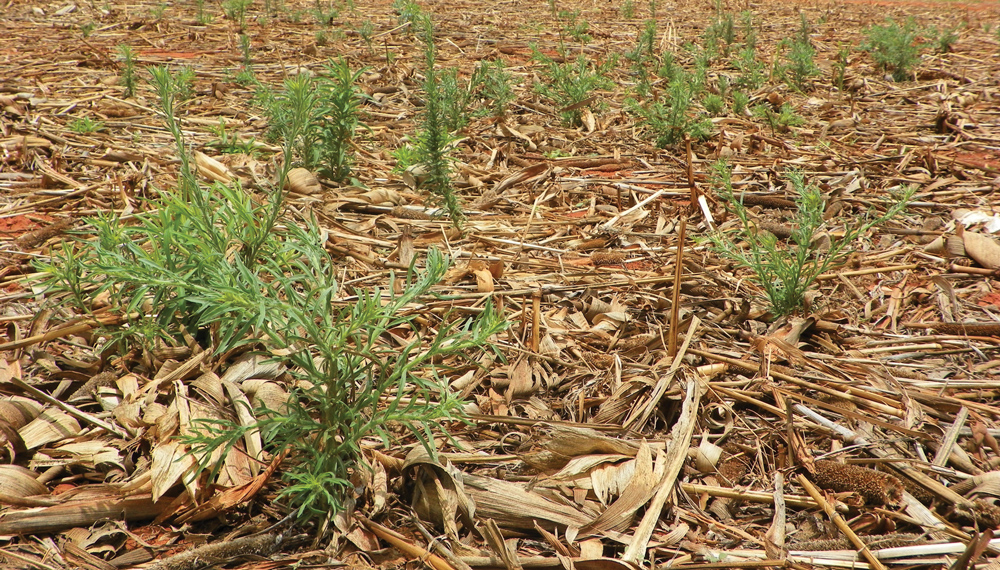October 2024
| DR LAVINIA KISTEN (RESEARCH COORDINATOR INTERN) AND PFANO MUSETSHO (RESEARCH INTERN) FROM GRAIN SA |
 |
ON 26 JUNE, GRAIN SA HELD AN ENGAGING WEED SCIENCE DAY IN PRETORIA, BRINGING TOGETHER A DIVERSE GROUP OF PARTICIPANTS INCLUDING CHEMICAL INDUSTRY EXPERTS, RESEARCHERS, GOVERNMENT OFFICIALS AND FARMERS. THIS COLLABORATIVE GATHERING WAS DEDICATED TO TACKLING PRESSING WEED MANAGEMENT CHALLENGES THROUGH INNOVATIVE AND COOPERATIVE STRATEGIES.
Rising challenges concerning weeds loom over the grain industry, as weeds such as Amaranthus, Lolium and Conyza species are evolving, defying traditional control methods with increasing herbicide resistance. The goal of the Weed Science Day was to identify key areas of concern, assess current measures being taken and explore new strategies.
The day highlighted a growing challenge with herbicide resistance and underscored the need for the increased raising of awareness and continuous communication, as well as robust evaluation and monitoring. Alongside this, the current lack of capacity in weed science demands immediate intervention.
CURRENT WEED ISSUES FACING THE GRAIN INDUSTRY
In the summer grain region, the major challenge identified was the prevalence of Amaranthus and Conyza, which are suspected of developing resistance to herbicides such as glyphosate. A need was raised for more information on the distribution and occurrence of weed species in the summer grain region, and surveys can positively impact research priorities and initiatives.
An urgent need was highlighted for effective weed management strategies to keep farm productivity high and minimise economic losses from reduced crop yields and poor quality.

Conyza spp in a no-till field.
Photo: Dr Maryke Craven
HERBICIDE RESISTANCE
There has been a global rise in unique cases of herbicide resistance and South Africa is no exception. The South African Herbicide Research Initiative (SAHRI) was established after the first detection of Amaranthus palmeri in South Africa and has since been screening for herbicide resistance in A. palmeri and A. hybridus.
SAHRI’s screenings revealed that A. hybridus poses a significant threat to crop production due to increasing herbicide resistance build-up and its distribution across the country. In screening Palmer populations, varying glyphosate susceptibility was noted, as well as resistance to other chemicals – revealing no one-size-fits-all solution and emphasising the need for continuous monitoring.
In addition to SAHRI, researchers at the Agricultural Research Council and Stellenbosch University are conducting herbicide resistance monitoring. Diagnostic facilities and capacity are vital for identifying weeds and assessing herbicide resistance.
Efforts to combat herbicide resistance in South Africa’s grain industry, particularly within the summer grain production area, are paramount for ensuring sustainable agricultural practices. A comprehensive understanding of weed ecology and biology is essential to develop effective management strategies that can mitigate this growing threat. The industry is urged to actively support scientific initiatives, as their backing is crucial for maintaining focus on priority research areas.
MANAGEMENT STRATEGIES
Herbicides have long been regarded as the silver bullet for weed management, yet rising resistance to key active ingredients is undermining their viability. Moreover, the effective application of herbicides remains a challenge due to factors such as wind, timing and temperature.
An integrated weed management approach is essential for cost-effective management of the seed bank. This should include incorporating crop rotation, competitive crops, livestock, cover crops, row spacing and precision technologies.
Ultimately, it’s crucial to accept that fields will never be completely weed-free. The focus should be on managing weed populations effectively and balancing the costs of control against the damage caused by weeds.
Future directions
Effective weed management is essential for achieving high yields and maintaining crop quality. Technological advancements in weed control have been instrumental in enhancing agricultural productivity over time.
While herbicides have traditionally been a straightforward and cost-efficient method for weed management, their effectiveness is declining as herbicide-resistant weeds become more prevalent. This highlights the urgent need for cost-effective and sustainable weed management strategies to control herbicide-resistant weed populations through diverse, integrated practices.
To get in touch with the research community for advice or resistance screening, contact:
• Lavinia Kisten: 083 273 0709/lavinia@grainsa.co.za
• Pfano Musetsho: 065 887 7946/pfano@grainsa.co.za
Publication: October 2024
Section: Pula/Imvula